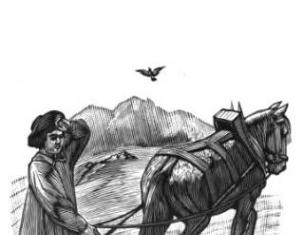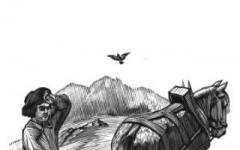“Honest Vigilance” is one of the most poignant victorious verses by Burns, created at the time of the fate of the French Revolution (1789) under the influence of the book of the American revolutionary publicist Thomas Paine “Rights of the People”. "Chesna Vidnist" became widely popular in the Scottish people's song. A lot of contemporary people called it the "Marseillaise of the simple people".
Scottish in his own world about eternal food: what is wealth and wealth, what is honor and reason. How honor and reason will unite with wealth and wealth. The main theme is honesty from oneself, spiritual purity. The author urges people not to litter their camp tiєї zlidnіv, as if they were repulsed. To ask them not to be ashamed of the one who stinks and not to quarrel with the so-called "nobility". And it is quiet, who to shy tse, navpaki, barks and calls "zhalyugidnymi". The proof of which mi bachimo is already in the first rows of the verse:
Who is honestly their vigilance
Shame and everything else
That najzhalugіdnіshy of people
The timid slave is the other way.
Why "Chesna Vidnist"? Should I give myself such a name by giving my own author? I think that behind expensive stones, luxurious houses, sleeping tents, a sea of expensive stone and other speeches, according to Burns, most of all, they were more likely to seek only silliness, deceit, stupidity and other negative qualities, authorities in "false" people. You know that people are honest, summary, shanut morality - often they are left with nothing in their life and become a class of the poor. And those who are cunning, podlishy and may have a greater part of such yakos-i є "upper", "nobility". To that vigilance is honest. Even if you marvel at the richest speeches, all the writing is dressed up and luxurious, then behind it cry even richer nonsense, there is the foundation of everything. And if you look at those who are with the great poor peasant, then don’t marvel at what, everything that is, has lost its honesty. And even more often, going for morality and for the call of justice, we are left behind for a bag of nothing in the material plan, protecting ourselves from ourselves. The rightness of a person is in її razumі and pratsovity, so respect Burns. You can’t hide foolishness with shovkovy cloth, you can’t add dishonesty to expensive wine.
Behind the plot, there is a verse of bachimo, which here is cited to one falsehood of riches - honestly bіdnim. What is revealed to us for the help of equal lives of some of those others
We have bread and drink water,
Mi hovaemosya ganchir'yam
And then,
And at the same time, a fool and a shahrai
Dressed in shovk and drink wine
And so іnshe.
Behind the composition, the verse is guessing a standard folk song (which is becoming a good thing). Є couplet, with a singing zmіst, after some kind of constant repetition of the song words, like a kind of melodiousness.
With whom,
With all that
Similar repetitions are practically observed in all folk songs. The first part of the conspiracy is left permanently, the other part is permanently changed, and lie behind the theme to the front couplet, which establishes the standard scheme of the appearance of meaningful parts between them, which shove the cob, the middle and the end.
The very tone of the verse and yoga mood does not give up tragic, unimportant to those who play the role of vikriti strengthen the vadi liar and the dishonest and oppose their honest marriages. Burns himself was a peasant-man of the people, and having written to him in a simple and clumsy manner, in simple words, understandable to a mortal. Zvіdsi y take coils of yogo simple poetry that lifts the spirit. Reading “Chіsnu Vidnіst” you understand why a lot of rows of yoga creations have become extinguished, aphorisms. Having dedicated his creativity to forgive people, who sings deservedly having taken away the popular recognition of that love. Just like that, the energy and emotion of the verse are added to the parts of the rhetorical viguki:
Wealth - Stamp on gold
And the golden one is Mi yourself!
Otherwise, you can watch for yourself in the end of the third season:
Deck to lose a deck
I in orders, and in lines!
And so practical like a skin couplet, or another.
There is also a large number of phonetic repetitions (aliteration) of some sonorant voiced sounds, and zokrema [l ”], [m], [n], sho, in his line, we give even more mood and set the rhythm: The lyric hero does not resonate with himself vіd natovpu, but navpaki go to yourself with the same people, like vin:
- 1. Let me be with you
- 2. Mi bread їmo і water p'єmo
- 3. Mi hovaєmosya ganchir'yam
Vіn dіє vіd іmenі people, vyslovlyuє yоgo dumіvі vіrshi, rozpoіdayuchi pro їхнє їнє їнєі everyday life. You don’t see it right, you call out to unite everyone, who is the “brother” of his spiritual and material, who again will show us him as a reflection of the thoughts of “mere mortals”, who never knew such chic wine, written cloth and expensive overseas rozvagi.
The main role of simplicity of this verse is played, well, yogo rozmir. Chi is not confusing, not cumbersome, light and simple twofold iambic - the best choice for the top of the topic. As it has been said more than once, Burns's verses easily fall on the music and become forgotten, and behind the rhythm and zmist "ChW" easily turned into a widely spread Scottish folk song, which far away predictably primitively create more than an early hour, with which people accompanied their practice. games.
Practically skin a row of piercings with positive attitudes, believing in a better future for those who can overcome justice. The author does not hesitate, and directly expresses his position with a proud vevnenistyu and a direct look at the future:
The day and the year of trials will come
If the mind is honored
Black will come to all the earth
We stand at the first place.
Well, I know, reading the rows, and mimicking myself begin to believe in this word. The first of these verses was written in order to raise the national spirit and not let it fall. Sob pіdtremati skin, hto vzhe vyvsya vіd usіh bіd, scho called on the new one in such a camp, and zmіg marveled far away. As a sensi, one can boldly say that Burns instantly, boldly raises the rebellion and be a people's leader, shards literally guess the thoughts of a skin man, as if he were in such a camp.
The main idea of the verse, I am understandable through the antithesis, is a constant reflection of wealth and wealth, honesty and deceit, for example, through objects, I will try, or from rhetoric about everyday life:
We have bread and drink water,
Mi hovaemosya ganchir'yam
And then,
And at the same time, a fool and a shahrai
Dressed in shovk and drink wine
And so іnshe.
vikrivalny virsh antithesis
Let's honor, but to bad and unillumined people sings against sensible and honest workers. Bad people are often good people. A good person can hover over a filthy cloth. And on the other hand, whoever wears a rich robe is often seen as a “fool and shakhrai”. To that, Burns calls us "to judge not by cloth", but the poor - do not litter your vigilance.
To strengthen the effect of antithesis, and to add to the special lightness of that emotionality of the verse, to this the parts are repeated and equalized (wonderful). In our days, the top is more popular for its theme. It is easy to remember and may become even more popular, as it will be transferred by a contemporary Vikonian to new music. For example, like those songs of Tsoy chi Visotsky, like so much love to sleep juveniles were rich. At the same time, it is not particularly popular, although it is used by such young singers as Maria Cherkaska, Ephraim Flaks thinly, and also in the house of performances at the show "Robin Hood" at the production of one of the Moscow musical theaters.
Robert Burns, a Scottish poet, wrote the line "Honest vigilance". The votchisnyany chitach singsongly recognized this work at the translation of Samuil Marshak. As you can see from the name of the creation, the author asks for calm food. For the new one, it’s important to say: what is such vigilance and what is wealth, what is honor and such wisdom. Why is it possible that in one person honor and reason united at the same time? What can be called an honest and sensible rich person?
Robert Burns is alive in the 18th century. Todi Great Britain was cherished by a wealth of English nobility. If they weren’t always stinky, they could be smart and could take such rational decisions, the appearance of titles and pennies gave them impersonal rights, among them the possibility to take part in the management of the country.
With whom there are a lot of people, they showed their minds and swayed their goodness, but with whom they were not rich enough and did not have a noble trip, they could not know themselves in their life, they were not included in the management of the country. Such a situation was poetically unfair, and criticism of the current order was voiced and voiced by his work.

Whom does Burns respect with the right noble and noble people? Nasampered, before them bring wine quietly, who independently earns his own life on his own practice. According to Burns's thought, it is impossible to judge a person by their odor, how to wear a wine, but to a fault, how to wear a wine, according to zhі, like a wine, it is impossible - such assessments will be superficial and do not seem to be the true inner sea of a philanderer. There are many important spiritual characteristics of a person - kindness, intelligence, honesty. And then you go to another food plan, the appearance of pennies from the hamants.
Vіrsh was prompted to represent the poor, the scarlet, the rich, the scarlet. The author states: wealth often does not give its Volodar the characteristics of an honest and gentry people. Most often, people are chatting, such wealth has turned into bad and unclean hands. No, in the author’s opinion, pennies and titles cannot replace the mind and conscience, for, unfortunately, they were spent in the void until glory and wealth.
Like literary criticism, political opinions, which were seen in Europe during the life of Robert Burns (for example, the French Revolution) could not fail to be known in a new, in the same manner of the sheet, that visvelennya of social problems. The author has widely respected the revolution as a way out for the situation that has developed in England, without failing in another way to relieve people of evil and lack of rights, they have thrown into them the bajanna of possible owners.

In the course of the confession, Burns attacks with criticism of the absolute monarchy as a social device, which at that time was panting in Europe. Behind the words of the author, the king, for a moment, work everything that you can think of. for whom it was not possible to be super-chit and whom it was not possible to criticize, in fact, it was the quintessence of all that evil, as if it were panting in the support of that hour.
The verses of the Scottish poet have been popular in the midst of chanuval literature for over 200 years. Rows of the most important works of art have become extinguished for a year, under which revolutions were born. Reading “Chesnu Vidnist”, marveling at the fact that a simple farmer (and the very same likeness to the author) could create such a vishukani balady, a messenger of epilepsy. With all the wines, I practiced physically, and the practice of yoga was important and the hour was unbearable, I didn’t get far to take in the new tiєї joy of life, ієї merry and ієї love to humanity, like to go through all yogo creation.
Who is honestly their vigilance
To be ashamed and everything else,
That najzhalugіdnіshy of people,
The timid slave is the other way.
With whom,
With whom,
Let me be with you,
Wealth -
stamp on gold,
And the golden
Mi yourself!
We have bread and drink water,
Mi hovaemosya ganchir'yam
And then,
And at the same time, a fool and a shahrai
Dressed in shovk and drink wine
And so іnshe.
With whom,
With whom,
Judge not by cloth.
Who honestly suits pracey,
Such I call to know
The axis of the blaze is a nature lord.
Youma may bow to me.
Ale, let's not go prudish and proud,
Get rid of the deck!
With whom,
With whom,
I want all the wines at the laces,
Deck to lose a deck
I in orders, and in lines!
The king of his footman
Appoint a general
Ale vin can't nobody
Appoint honorable Malim.
With whom,
With whom,
fences, forests
Other
Do not replace
Rozum is honor
And so іnshe!
The day and the year of trials will come,
If the mind is honored
Black will come to all the earth
We stand at the first place.
With whom,
With whom,
I can tell you
What will be the day
If navkolo
Usі people become take!
Analysis of the verse "Honest Vigilance" by Burns
The Scottish poet Robert Burns is alive in the 18th century, at that hour, when the aristocracy was in power, and the fortunes of those short-lived people were attributed exclusively to their adventures. Alas, it was the revolutionary hour, and new ideas were already gaining strength.
He sings himself, coming from a poor rural homeland. Vіn z childishness posterіgav life of the common people, richly pratsyuvav and knowing how often wealth and high title accompany foolishness and greed. The main theme of this verse is "Cheerful Vigilance" - a representation of the nobility, manners, pihatoy and empty, and poor people. The author honors vigilance with honesty, and calls the one who is shameful a pitiful one.
The verses describe the suspension of that hour. The king can give a lackey a ring, but you can’t give him honesty and reason. And the right of the nobility, in the thought of Burns, is those who can make wealth: a clean conscience, the goodness of a working person and kindness. Ale tsі people zmushenі їsti bread, drink water and hovatsya ganchir'yam, the same as titled shahrаї dressed in a seam, drink wine, fawn with different privileges and cherish the country. Tsey steal the unfair camp of speeches by calling out the foolish progressive people, France already had a revolution, the whole of Europe stood on the threshold of change. He sings of admonishment, that the hour has come, if the mind and honesty take their rightful place, pracity will be appreciated, and all people will become brothers.
Versh writings in the style of folk songs, which became a fortune. Easily for the form of that style, it fell to the relish of the common people and imitated more early folk creations, like they slept for an hour of work or after it with a cheerful company. Irrespective of the vagomity of shouting at the ranks of suspenseful problems, the tone of the creation of raising, cheerful, wine conveys the mood of the bad, like in the minds of an important worker, they still sing the songs and the joy of life. I am not a third-party author, I will go to myself with simple people, I will express my thoughts.
“Chesna Vidnist” is a tvir that has not lost relevance in our days. The nourishment of social uneasiness is not so hospitable, like two hundred years ago, but, like before, they praise miserable people. I, even though the verses no longer care about the popularity of the folk dance, the stench is played by schoolchildren and students, victorious in theatrical productions, and tell us about love to people, that faith in justice.
Tvir
The Scottish sings Robert Burns at his verse "Chesna vigilance" rozmirkovu about eternal food: what is vigilance and wealth, what is honor and reason. How honor and reason will unite with wealth and wealth.
At the top, there are poor people, but only honestly and richly, but not honestly people. Vin is convinced that wealth does not mean that Yogo Volodar is a man of honesty and nobility. Shvidshe navpaki: often a rich person is seen as a bad and wicked person. I think that for Robert Burns (and he lives in the XVIII century) it was so. Everything in England was run by wealthy and noble people. The stench was not obov'yazkovo wisest, but their pennies and their titles gave them the right to play with the country. At the same time, even richly sensible and good people could not know how to get stuck in their comforts. Aje stink bіdnі that ignoble adventure. Axis Robert Burns and speaks at his own vіrshi with criticism of such orders:
* Mi bread їmo і water p'єmo,
* Mi hovaєmosya ganchir'yam
* І all the same,
* And at the same time, a fool and shahrai
* Dress in shovk and drink wine
* And everything else.
For Robert Burns himself, the right of the nobility is the people who earn their own life of their own practice. It seems that you can’t judge a person by the cloth (and I’ll be fine with her), but the smut, that she’s working and she has a soul. If a person is kind, if she is reasonable and honest, then it doesn’t matter who is out for her adventures and how many pennies she has. First of all, if there were no pennies and titles in a person, the stench cannot be replaced by neither reason nor conscience:
* With all that,
* With all that,
* I want all the wines in the laces,
* Deck to lose a deck
* І in orders and in lines!
Even in rich lands, the basis of the social harmony was an absolute monarchy. I king instantly work everything he wants. Nothing is a moment for you, no reason for being super-ready. No one could criticize the yogo vchinka, to the one who was the most famous person in the country. I vіn vіg recognize if I'm going to plant a bad person, I'm dishonorable only to the one who knows her root: King of his lackey
* Appoint a general,
* Ale vin can't have anyone
* Appoint honorable Malim.
And all dovkola may support such decisions. Forgive me, people are small to bow in the presence of a nobleman only to the one who is a lord. And no one said that any lord could be a “pack of decks”. To such people, Robert Berne opposes intelligent and honest workers. For the new one, there is no one better for these people. And let them have few pennies, but the stench is rich in soul. I call on these people not to be ashamed of their vigilance, not to think badly about yourself only to those who have an empty gamanets in you: Who is your honest vigilance
* Shame and everything else,
* That nayzhalugіdnіshy of people,
* The timid slave is the other way.
I do think so. I think that if the bіdnyak starts to shirk in front of wealth, it’s wrong. People so belittle themselves. Vin becomes a right slave. Let it not be factual, but in your own, in your heart. Win a penny slave. Robert Berne is absolutely right: money, no hedges, no forests, and no other way to replace people, no reason, no honor. I, like the miraculous Scottish poet Robert Burns, really want that when that day and year come, all people will be equal one before one, if there are no noble and ignoble, there will be no poor and rich. And in the first place, everyone has reason and honor!









